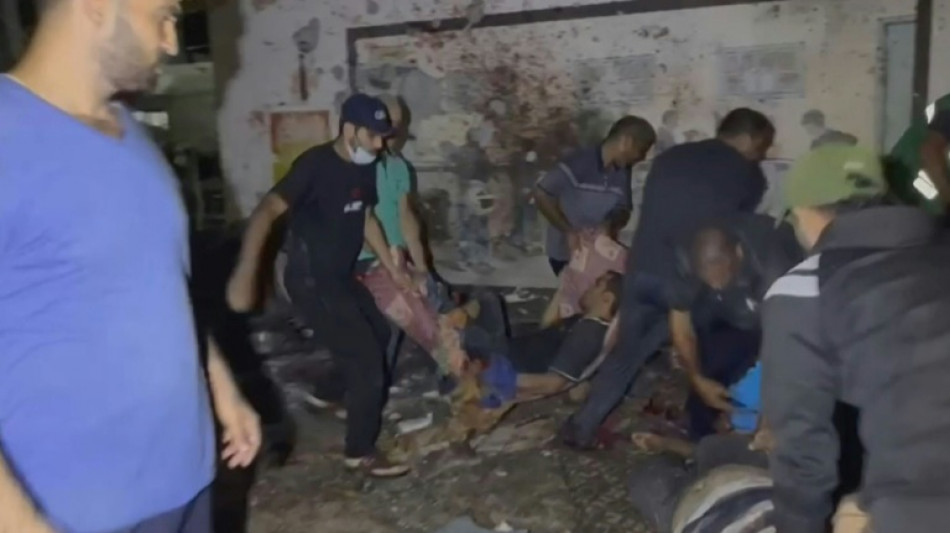
Israel presses Gaza offensive despite US call for 'pause'

Israel resisted US calls for a pause in fighting and pressed its siege of Gaza City Saturday, with deadly strikes hitting an ambulance convoy and a school-turned-refugee shelter.
As Israeli Prime Minister Benjamin Netanyahu rebuffed pressure from visiting US Secretary of State Antony Blinken to enact a temporary humanitarian truce, the nearly month-old war in Gaza raged unabated.
Israeli ground forces have encircled Gaza's largest city, trying to rout Hamas in retaliation for October 7 raids that killed an estimated 1,400 people inside Israel, most of them civilians.
At the Osama bin Zaid Boys School north of Gaza City, AFP saw the aftermath of what Hamas authorities said was tank shelling that killed 20 people.
Ambulance teams rushed into the debris-littered building to aid the injured and remove the dead.
Stunned onlookers wept and wandered the scene with hands clasped above the head in horror and disbelief.
Israel's military describes Gaza City as "the centre of the Hamas terror organisation".
Israeli military spokesman Richard Hecht said forces were engaged in "close combat" with Hamas fighters who were armed "with anti-tank missiles, explosive devices and more."
Israel says it is targeting Hamas operatives, weapons stores, tunnel complexes, drone launching posts and command centres.
But with strikes taking place in densely populated urban areas, many civilians have died.
Hamas-run health authorities claim more than 9,200 Gazans, mostly women and children, have been killed.
Speaking in Tel Aviv, Blinken accused Hamas of "cynically and monstrously" using civilians as human shields, and of deliberately locating military assets "beneath residential buildings, schools, mosques, hospitals."
But a key focus of his trip was to convince Israel to enact "humanitarian pauses", which the United States believes could help secure the release of roughly 240 hostages thought to be in Hamas captivity, and to allow aid to be distributed to Gaza's beleaguered population.
Netanyahu, who has made a political career out of hawkish security policies, warned that there could be no "temporary truce" in Gaza until Hamas releases the hostages.
- 'Utterly shocked' -
Israel says it has struck 12,000 targets across the Palestinian territory since "Operation Iron Swords" began on October 7, one of the fiercest bombing campaigns in recent memory.
In Gaza City's centre, there was another strike Friday, this one on the doorstep of the territory's largest hospital Al-Shifa.
Israel's military said it had targeted an ambulance used by a "Hamas terrorist cell" and had "neutralized" those inside.
"We emphasise that this area in Gaza is a war zone. Civilians are repeatedly called upon to evacuate southward for their own safety," the Israel Defense Forces said.
The Hamas government said 13 people were killed.
An AFP journalist saw multiple bodies beside the blood-splattered Palestinian Red Crescent vehicle.
A child was carried away and a dead horse lay nearby, still tethered to a cart.
The Red Crescent said a convoy of five vehicles had been destined for the Rafah border crossing with Egypt, when they were struck multiple times.
One vehicle had been transporting a 35-year-old with shrapnel wounds.
World Health Organization chief Tedros Adhanom Ghebreyesus said he was "utterly shocked" by the strike.
"We reiterate: patients, health workers, facilities and ambulances must be protected at all times. Always", he said.
A senior White House official on Friday said that Hamas had tried to use a US-brokered deal on opening the Egyptian border crossing to get its cadres out.
Hamas provided a list of wounded Palestinians for evacuation with one-third of the names those of Hamas members and fighters, the official said.
"That was just unacceptable to Egypt, to us, to Israel," the official added.
Egypt's health ministry said just 17 wounded Palestinians were evacuated for treatment in Egyptian hospitals Friday instead of the 28 originally planned because of the "events" at Al-Shifa.
- Shuttle diplomacy -
On Saturday, Blinken is due to hold talks in Amman with the foreign ministers of Jordan, Egypt, Saudi Arabia, the United Arab Emirates and Qatar.
That meeting comes amid mounting Arab anger over the civilian death toll from war, and increasing fears that the conflict could spread.
The leader of Lebanon's powerful Iran-backed Hezbollah movement, Hassan Nasrallah, on Friday broke weeks of silence to blame the United States for the violence.
"America is entirely responsible for the ongoing war on Gaza and its people, and Israel is simply a tool of execution," he said in a televised broadcast, accusing Washington of impeding "a ceasefire and the end of the aggression".
Nasrallah warned Israel against attacking Lebanon and said the possibility of "total war is realistic".
Israel's Netanyahu warned Hezbollah it would "pay an unimaginable price" for any misstep.
- Workers expelled -
In Israel, authorities began forcing thousands of Palestinian workers to return to Gaza.
"Thousands of workers who were blocked in Israel since October 7 have been brought back," the head of Gaza's crossings authority, Hisham Adwan, told AFP.
The United Nations Human Rights Office said it was "deeply concerned" about the expulsions.
"They are being sent back, we don't know exactly to where," and whether they "even have a home to go to", spokeswoman Elizabeth Throssell told a news conference in Geneva.
Before the war started, some 18,500 Gazans held Israeli work permits, according to Israeli defence officials, but it was not clear how many were in the country on October 7.
(W.Novokshonov--DTZ)
